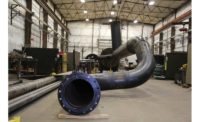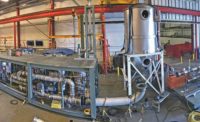The Freeport, Ill., headquarters of Mechanical Inc. may not resemble the time portals of science fiction, but a look inside provides a glimpse, if not of the future of construction, then at the very least it offers a view of the technology-driven cutting edge of present day.
Part of the Helm Group, a family-owned assemblage of specialty subcontractors currently led by Brian Helm, president, the 800-person Mechanical Inc. has long been an early adopter of emerging tools and methods that have improved both the efficiency and quality of its core mechanical, concrete and steel erection services.
Early forays into 3D CAD for pipe fabrication drawings in the late 1990s ideally positioned Mechanical to eventually take a leading role in BIM-based collaborations with other trades, with the company now frequently serving as the model manager for the projects it works on.
Mechanical is also among the few specialty contractors to bring virtual and augmented reality tools to the field, including Matterport and the self-contained HoloLens technology, which helps project team members and end-users document and visualize system component configurations before, during and after construction.
“They’ve always pushed the envelope,” says John P. Weaver Jr., the general superintendent for BE&K Building Group in Chicago who has worked with Mechanical for nearly 15 years. “Their job trailers are as advanced electronically as any general contractor’s would be.”
The company has likewise made significant investments in prefabrication of HVAC and plumbing assemblies as well as sheet metal. Four manufacturing facilities totaling 120,000 sq ft are strategically located in Illinois (Bridgeport, Freeport and Rockford) and Nebraska (Omaha) across the firm’s Midwest markets.
The company utilizes management software such as FabPro to more accurately monitor productivity and uses Stratus to track module progress through installation.
“This helps us identify and track value rather than just going by gut feel,” says Helm.
Consistently being on the leading edge of key construction trends wasn’t the only reason for Mechanical’s selection as ENR Midwest’s Specialty Contractor of the Year.
With continued overall growth in the Midwest’s key health care and industrial sectors, Mechanical’s process-driven foresight has paid off with a sustained 10% growth rate in each of the past several years. That includes 2017, when the firm recorded $304.7 million in revenue from projects in ENR Midwest’s 11-state coverage area.
Major projects in the region included $44 million of steel and mechanical work at Northwestern University’s new Kellogg School of Management in Evanston, Ill.; a $60-million contract for mechanical, plumbing and medical gas systems at Mercyhealth’s $465-million medical campus in Rockford, Ill.; and installation of new high-temperature water generators at O’Hare International Airport under a $39-million contract.
Mechanical’s HVAC service division, created in the late ’90s to bring the company’s expertise to other elements of building system operations, has grown steadily over the past 15 years. Helm says the division “allows us to diversify and stay in front with customers throughout the system’s life cycle.”
A Culture of Care and Awareness
Helm considers safety another key differentiator for the company. In calendar year 2017, the firm performed more than 1.5 million worker-hours and maintained an EMR of just 0.52. Helm reports that the company’s most recent October-to-October EMR year shows further improvement, to 0.48.
“We’ve developed a culture where our safety staff focuses primarily on training rather than enforcement,” he says. “That makes their role more collaborative with the project teams.”
The company has begun testing wearable exoskeletons that help worker ergonomics and eliminate injuries.
Mechanical’s field staff regularly performs intricate tasks in close proximity to hazardous industrial materials and processes.
“We have foremen who’ve been with us for decades, yet they’re very adept with technology. They can navigate BIM as easily as our CAD operators.”
– Dale Cox, Vice President, Mechanical Inc.
“You need to be committed to a program that recognizes those hazards and proactively acts on them,” says Dale Cox, vice president at Mechanical. “We have foremen who’ve been with us for decades, yet they’re very adept with technology. They can navigate BIM as easily as our CAD operators.”
Prefabrication, which may be relatively new to a lot of specialty contractors, is already firmly ingrained in Mechanical’s culture.
“We look at it more as ‘what can’t we prefab’ rather than the other way around,” says project executive Ryan Blackman.
Combining these methods enables Mechanical to adjust to owners’ increasing emphasis on schedule. For the Mercyhealth project in Rockford, the company used BIM to accelerate the design and fabrication of multitrade corridor utility racks, finishing the work in approximately two months.
Greg Werner, senior vice president for Mortenson Construction, which is leading construction of the Mercyhealth project, says Mechanical’s willingness to innovate is a boon for any project.
“When we want to try something new, they embrace it,” he says. “Their planning and organizing of prefab components helped us deliver the project on schedule.”
Because sophisticated trade partners are essential for successfully executing prefabrication projects, not to mention utilizing the technology that makes such projects possible, Mechanical project executive Kyle DeWall says the firm’s staff often take on the role of educators.
“Projects like these are good opportunities to expose smaller, more local trade partners to … technologies and how they work,” he says.
A Schedule-Centric Future
Helm foresees schedule becoming an even more critical element of Mechanical’s projects in the coming years, particularly speed-to-market in manufacturing.
“Large projects will likely always have construction managers,” he explains. “But in situations where owners require specialty MEP work for an existing facility, they’ll likely reach out to experienced specialists like us who can handle it.”
Helm also expects less tolerance for owners of smaller contractors who are unable to meet commitments or are prone to making missteps.
“They don’t want to deal with companies that make mistakes in bids, then come back asking for more money,” he says. “It’ll become more about schedule and safety than price.”





